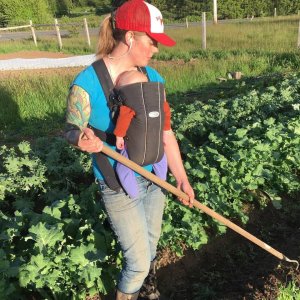Clatsop residents flood local farmers markets when spring arrives. Gatherers enjoy the social atmosphere, as well as the fresh locally sourced produce. For attendees who find mid-week lulls in their veggie consumption, Community Supported Agriculture (CSA) might be a solution.

CSAs were rooted in Japan and several European countries in the 60s. According to Just Food, a group of Japanese women were the catalysts. They were “concerned with the use of pesticides, the increase in processed and imported foods and the corresponding decrease in the farm population.” Twenty years later, the idea of teikei, translated “food with a farmer’s face,” inspired the movement in the U.S.
Since then, CSAs have flourished. In 2015 the United States Department of Agriculture (USDA) reported over 7,000 farms who partner directly with community members. CSA members share in the risk and reward of a local farm’s operation. “You buy in early to allow a projected season for the farmers, your share gives funding to put forth garden planning,” explains North Coast Food Web’s kitchen coordinator Wendy D’Agostino. “Without that it can be a tricky and challenging piece.” North Coast Food Web works with farmers, local organizations and community members to make connections on topics surrounding food. Many farmers also use the location as a drop site for CSAs.
If a CSA share is purchased, members are repaid through the harvest of the farm. “There are benefits all the way around,” Wendy describes. “You get to know your farmers and improve our economy by buying and shopping close to home.”

“It is important to sustain farming as a source of income,” she continues. “A lot of farms today aren’t continuing. The average age of farmers is older, it is hard work and low return.” This may be a contributing factor to the downward trend in our county as well. According to the most recent USDA census data, there are 199 farms in Clatsop, a drop of 13 percent from 2007.
The future may hold an upward shift, however. Linda DePersis, a local farmer reflects on the area’s growth in her experience. “We are beginning to run into more backyard gardens on a larger scale, homesteading and a back to earth lifestyle,” she notes. Up and down the coast, residents may also notice new farms are popping up.
Clatsop County CSA Farms

Two years ago, Spring Up Farm began tilling soil in Knappa, a locale with few farms, which is one of the reasons owners Kelly Huckestein and Sam Seulean chose to start farming there. That, and the challenge, Kelly explains. The couple must travel as far as Portland for some basic thigns like fertilizer and compost because of the low demand in the area. Even with obstacles, they are making growth and setting goals for the future. “Building a successful farm business on the coast is doable,” Kelly says.
Further down the coast in Nehalem, another recent arrival is Moon River Farm. Owners Lily Strauss and Kayleigh Hillert are headed into their second season with generations of family experience in their back pocket. After meeting as Willing Workers on Organic Farms (WOOFers), the couple decided to join together and follow their passion for small scale vegetable farming. As descendants of farmers, the women have learned a lot of lessons. “Work smarter, not harder,” Kayleigh says is one of those lessons. “We are constantly looking for ways to bend over less, put things on wheels, and make things more efficient.” In 2018 the farm is looking forward to a drier spring and an exciting season of marketing and CSAs.

Residents should also be on the lookout for more established farms in the area. Barefoot Farm and Flowers is a great stop off Highway 30 in Clatskanie. Ten years ago, owners Linda and Angelo DePersis started growing food for their family. “I never can just do a little bit,” Linda jokes. So when she discovered that other people were also looking for local food, her hobby turned into something much more. Farming seventeen acres, they started a CSA. Then, last July they purchased Sweet Boutique Flower Barn & Clatskanie Floral. This venture has led Linda to become a certified florist and allowed the farm to branch out from a typical CSA model. Instead of requiring a purchased share in their farm, the couple is offering fresh produce at their new shop six days a week. “(A CSA) just didn’t match up with our current need,” Linda explains. “Now we have an actual place for shopping daily with fresh produce.”
Lazy Creek Farm, in Astoria, is home to the Sunderlands – longtime residents and settled fixtures in farming. Ruth and Gary have been farming commercially for nine years and have grown a bit each year. Ruth says farming is a learning process, but, the best tool in their shed is learning from the other farmers. “There is no competition (between farmers) in the area, we share info and ideas,” she explains. So, for new farms arising in Clatsop, their advice is to make friends.

With so many farms, most residents of Clatsop County have a CSA farmer within reach. Astoria is served by Lazy Creek Farm and Spring Up Farm and their drop sites can be accessed by neighboring communities as well. Moon River Farm has drop sites in Tillamook, Rockaway, Wheeler, Nehalem, Manzanita, Cannon Beach and Seaside. Typically, members receive a box of in season produce weekly. Options for CSA shares, however, vary by farm and residents of all levels of vegetable intake can find a good fit.
So why join a CSA? “You share in the bounty and the risk,” says Kelly Huckestein of Spring Up Farm. “This allows you to develop a close relationship with our farm and learn more about how your food is grown.”












